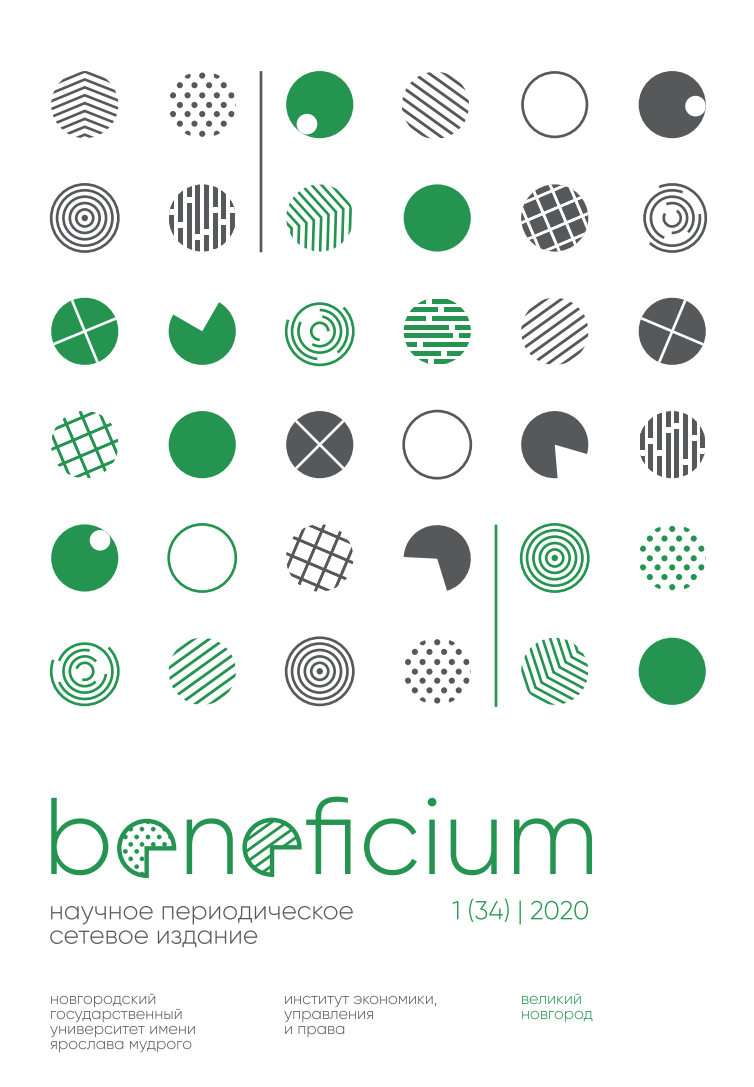PROSPECTS FOR A GREEN ECONOMY IN RUSSIA
Abstract
Scientific and technological progress and the impact of anthropogenic factors have led to an aggravation of the environmental situation and socio-economic tensions throughout the world. Problems of depletion of natural resources, pollution of the natural environment, deterioration of human health due to the negative impact of environmental factors require the search for new solutions to eliminate them. Poor environmental conditions hinder the sustainable development of countries and regions. Taking into account environmental factors in the development of national and regional development programs, justifying environmentally sound investment programs and projects, and addressing resource-saving issues are becoming more and more relevant. There is a growing correlation between the economic and environmental spheres, which are the main components of sustainable territorial development. The main obstacles to economic growth today are the increase in pollution and environmental degradation, the depletion of natural resources, the imbalance of the biosphere, and negative climate changes, which lead to the deterioration of human health and limit the possibility of further development of civilization as a whole. At the same time, achieving the key goal of the programs of the socio-economic majority of countries – improving the well-being of the population – is not provided with the necessary quality of life. This determines the relevance of sustainable development and the demand for the direction of the green economy in the world. In adapting the green economy model, each country has its own national characteristics and national specifics. In Russia, in our opinion, the model of green economy should focus on identifying underlying conditions and factors contributing to the development of green economy in the regions, taking into account existing in the world of science various models of green economy and foreign experience of introduction of green economy in the practice of public development, and also taking into account the increases in the world the value and role of alternative energy, solar energy and bioenergy based on wood fuel.
Keywords: carbon-free economy; biomass; bioenergy; ‘green’ infrastructure; green economy; sustainable development.
References
Zakharova T.V. «Zelenaya» ekonomika kak novyi kurs razvitiya: global’nyi i regional’nyi aspekty [‘Green’ economy as a new course of development: global and regional aspects] // Tomsk State University Journal of Economics. 2011. No. 4 (16). pp. 28-38. (In Russ.).
Mingaleva Zh.A. & Shpak N.A. (а). Modelling of Scenarios of the Dynamic Development of Environmental-Socio-Economic Systems in the Conditions of Re-industrialization of Russia // Journal of Economy and Entrepreneurship. 2014. Vol. 8. No. 4-2. pp. 869-872. (In Russ.).
Mingaleva Zh.A. & Shpak N.A. (б). Features of the application of eco-efficiency approach to the formation scenarios eco-socio-economic systems // Journal of Economy and Entrepreneurship. 2014. No. 5-1. pp. 285-288. (In Russ.).
Mingaleva Zh.A. & Shpak N.A. (в). Features of the development of eco-socio-economic systems on the basis of alternative energy sources // Modern problems of science and education. 2014. No. 5. pp. 310-317. (In Russ.).
Mingaleva Zh.A. & Shpak N.A. (г). Assessment of development potential of alternative bio-energetics in Russian regions on the base of transition to the national model of green economy // Agrarian Bulletin of the Urals. 2014. No. 9 (127). pp. 85-89. (In Russ.).
Porfirev B.N. «Zelenaya» ekonomika: obtwemirovye tendentsii razvitiya i perspektivy [‘Green’ economy: global development trends and prospects] // Vestnik Rossijskoj Akademii Nauk. 2012. Vol. 82. No. 4. pp. 323-332. (In Russ.).
Burkart K. How do you define the ‘green’ economy // MNN – Mother Nature Network. January 9, 2009. Available at: https://www.mnn.com/green-tech/research-innovations/blogs/how-do-you-define-the-green-economy (accessed 25.02.2020).
Vukovic N., Pobedinsky V., Mityagin S., Drozhzhin A. & Mingaleva Zh. A Study on Green Economy Indicators and Modeling: Russian Context // Sustainability. 2019. Vol. 11. No. 17. Art. 4629. doi: https://doi.org/10.3390/su11174629.
Mingaleva Zh, Vukovic N., Volkova I. & Salimova T. Waste Management in Green and Smart Cities: A Case Study of Russia // Sustainability. 2020. Vol. 12. No. 1. Art. 94. doi: https://doi.org/10.3390/su12010094.
Pearce D.W., Markandya A. & Barbier E. Blueprint for a Green Economy. Earthscan, 1989. 541 p.
Authors
Natalya A. Vukovic – PhD in Economics, Docent; Vice Rector for International Activities and Innovative Development, Saint-Petersburg State Forest Technical University, Saint-Petersburg, Russia.
E-mail: shpak17121978@gmail.com. ORСID 0000-0002-4593-2835. SPIN РИНЦ 8033-1010.
Zhanna A. Mingaleva – Doctor of Economics, Professor; Professor, Department of Economics and Industrial Management, Perm National Research Polytechnic University; Professor, Department of State and Municipal Administration, Perm State University, Perm, Russia. E-mail: mingal1@psu.ru. ORCID: 0000-0001-7674-7846. SPIN РИНЦ 5403-3663.
For citation:
Vukovic N.A., Mingaleva Zh.A. Prospects for a Green Economy in Russia // BENEFICIUM. 2020. No. 1 (34). pp. 39-45. (In Russ.). DOI: 10.34680/BENEFICIUM.2020.1(34).39-45.









